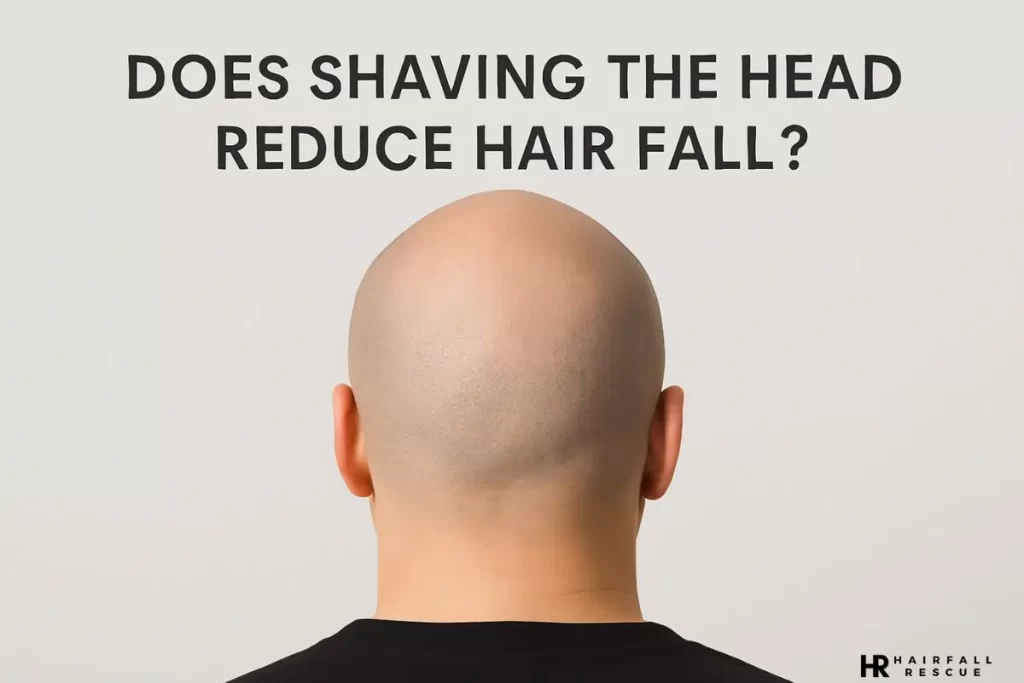
Introduction
Hair fall is a common concern that affects millions of people worldwide, regardless of age or gender. From teenagers to older adults, hair loss can lead to decreased confidence and anxiety about appearance. As a result, many people search for different remedies to reduce hair fall — one of them being shaving the head. But does shaving your head really reduce hair fall?
Let’s dive deep into this question, backed by science, expert opinions, and real facts.
What Is Hair Fall?
Before we address whether shaving affects hair fall, it’s important to understand what hair fall actually is.
Hair fall is the process where strands of hair detach from the scalp and fall out. On average, a person loses about 50-100 hairs per day, which is normal. However, excessive hair loss (more than 100 strands daily) could indicate a problem.
Common Causes of Hair Fall:
- Genetics (Androgenetic Alopecia)
- Hormonal changes
- Poor nutrition
- Stress and anxiety
- Medical conditions (thyroid, alopecia areata)
- Medications
- Scalp infections
- Use of harsh hair products
Does Shaving the Head Stop Hair Fall?
No — shaving the head does not stop or reduce hair fall permanently.
Shaving removes the hair shaft, which is the visible part of the hair. However, hair fall originates from the hair follicle, located under the scalp. Since shaving does not affect hair follicles, it cannot directly reduce hair fall.
Why do people think it helps then?
Let’s clear up this misconception.
Why This Myth Exists:
Many people believe that shaving the head leads to:
- Stronger hair growth
- Thicker hair
- Reduced hair fall
This belief comes from how freshly shaved hair appears when it grows back. The new hair often looks:
- Thicker
- Darker
- Sharper
However, this is just an illusion. The blunt tip of the new hair makes it feel coarser and thicker, but it’s not actually growing stronger or faster.
What Actually Happens When You Shave Your Head
When you shave:
- The hair is cut close to the scalp.
- The follicles underneath remain unchanged.
- Hair continues its natural growth cycle: Anagen (growth), Catagen (transition), and Telogen (resting).
If you were experiencing hair fall before shaving, the shedding will resume once the hair grows back.
Benefits of Shaving the Head
Although shaving doesn’t stop hair fall, it has some practical and psychological benefits:
- Reduces the appearance of thinning hair
- With no hair on the head, hair fall isn’t noticeable.
- Easier scalp care
- Makes it easier to apply oils, medicines, or treatments directly on the scalp.
- Gives a fresh start
- For some people, shaving helps them feel in control and reduces anxiety about hair fall.
- Low-maintenance
- No need to comb, style, or worry about hair shedding on clothes.
- Can boost confidence
- Many people embrace the bald look confidently (think Dwayne Johnson, Jason Statham, etc.)
What Does Science Say?
Dermatologists and hair specialists confirm that:
- Hair fall is a root-level problem.
- Shaving does not affect the roots or follicles.
- Hair fall caused by hormonal, genetic, or nutritional reasons will continue irrespective of shaving.
In medical terms, there’s no clinical evidence that shaving reduces hair fall.
Real and Effective Ways to Control Hair Fall
If you’re serious about addressing hair fall, focus on treatments and habits that target the root cause. Here are some proven methods:
1. Improve Your Diet
- Include protein-rich foods: eggs, nuts, fish, lentils.
- Eat iron-rich foods: spinach, beetroot, pomegranate.
- Consume Omega-3 fatty acids: walnuts, flaxseeds, fish.
2. Stay Hydrated
- Drink at least 2-3 liters of water daily to keep your scalp and hair hydrated.
3. Avoid Heat and Chemical Styling
- Minimize the use of blow dryers, straighteners, and hair dyes.
4. Manage Stress
- Practice yoga, meditation, and regular exercise to reduce stress-related hair fall.
5. Use Mild, Sulfate-Free Shampoos
- Harsh chemicals in shampoos can weaken hair. Choose natural or doctor-recommended options.
6. Scalp Massage
- Massaging your scalp with coconut oil or castor oil improves blood circulation, promoting hair growth.
7. Consult a Dermatologist
- For chronic or severe hair fall, consult a professional to check for:
- Hormonal imbalances
- Nutritional deficiencies
- Scalp infections
- Genetic conditions
8. Consider Medical Treatments
- Minoxidil (Rogaine)
- Finasteride (for men)
- Platelet-Rich Plasma (PRP) therapy
- Laser therapy
Conclusion
To summarize — shaving your head will not reduce hair fall. It may give a temporary sense of relief because the falling hair won’t be visible, but it won’t stop the actual problem occurring at the follicle level.
If you’re experiencing hair fall, it’s crucial to identify the underlying cause and address it with proper hair care, nutrition, lifestyle changes, or medical treatments.
Shaving can be a style statement or a fresh start — and while it won’t harm your hair health, expecting it to cure hair fall is a myth.
Frequently Asked Questions (FAQs)
Q1. Does shaving the head increase hair thickness?
No. Hair may feel thicker when it regrows due to the blunt edge, but the hair shaft’s actual thickness remains the same.
Q2. How often should I shave my head to reduce hair fall?
Shaving doesn’t reduce hair fall, so the frequency won’t impact the hair fall rate.
Q3. Can shaving cure male pattern baldness?
No. Male pattern baldness is genetic and hormonal. Shaving can improve appearance but won’t cure the condition.
Q4. Is shaving good for scalp health?
It can improve scalp hygiene and make treatments easier to apply, but it doesn’t directly improve scalp health or hair fall.
Q5. Will my hair grow back healthier after shaving?



Pingback: How to Grow Hair Faster: [ 6 Best] Vitamins and Supplements You Need - HAIRFALL RESCUE